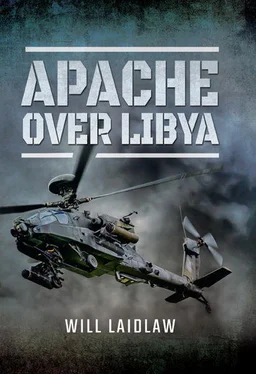With three months to go before we embarked I had an outline plan and almost all the aircrew. The ground crew soldiers were already mine, but I had yet to meet the engineering officer. The rest of the engineering team were made up from the 654 Afghanistan team and some of my old Ark Royal element. They were coming because they needed the respite, they’d been burned at both ends for too long and a six-week summer saunter around the Med was just the medicine. With ten weeks in Afghanistan done I flew home just in time for the arrival of my second daughter.
By late January 2011 the team that was largely yet to meet each other were at least all in one place, at the home of the Apache in Wattisham, Suffolk. Nick Stevens went straight to work sorting out the squadron for the Ocean trip. With his wife still serving on the ground in Helmand, he forwent much of his post-tour leave, preferring work to fill the space where an empty house and fear for her safety would otherwise occupy him.
By the time Nick had put the final aircrew names on the board we were an unusually strong team. Seven of the ten had Afghanistan experience in the past six months, the other three within the past year or so. The talent and experience was high. Once paired up, the average crew had over 4,000 total flying hours at the controls and a year of Afghanistan behind them. Such high levels of experience were very useful. Before we embarked I thought this would see us complete our training objectives while also allowing us to cope with the new environment. But when war beckoned just a month later it allowed us to cope with the unique complexity of the maritime environment and the intensity of combat. It gave us space to adapt, trial and pursue new ways of working as well as develop the upstarts, deal with the emergencies and stay one step ahead of the opposition.
By the beginning of April 2011 we were ready for the exercise, but somewhere deep in London a question was raised over what the Royal Navy might do if the situation in the Mediterranean got worse. Syria (least likely), Libya (not likely) and Yemen (most likely) were all possibilities for some sort of undisclosed activity, probably an evacuation mission. The Arab Spring, a wave of popular revolutions which started in Tunisia in late 2010, had spread to Egypt by January 2011, and now an uprising was taking place in Libya. Afghanistan was not the only focus in the MoD, and jets had been flying over Libya since late March. Gradually, questions were put to us – ‘What sort of defensive aids do you have? How long can you stay at sea?’ This was normal planning, staff officers making sure they had the answers when the politicians came asking.
The Defensive Aids Suite, or DAS, was our big ticket in the risk debate. We keep the technology close, but it is well known we have the best in the world, a box of tricks that allows us the time and space to use the offensive capability of the machine to the full. It is a collection of sensors and counter-measures, including chaff and flares. The system finds a threat, be it a radar, a laser or a missile launch, it alerts aircrew to the threat and, in the Apache, deals with it too. The extraordinary technology comes from Selex ES, and without it several of us would not be alive today and these pages would be a very different read.
Of course, the questions sent us into a frenzy of training and preparation. We cut short Easter leave to get everything done. Nick got the whole squadron up to date on their standard military skills such as shooting and first aid. He arranged briefings on the countries of interest and we refined our low-level flying and evading techniques in the simulator. A very confident RAF officer from the Air Warfare Centre came to brief us on the threat to helicopters in the Middle East and North Africa. The jets had been flying over Libya for a few weeks and the research had been done:
If you go feet-dry in the danger zone you’ll need to be on the lookout for every MANPAD in existence as well as the triple-A and radar threat. Libya is about as hostile as it gets for helicopters anywhere in the world.
Sobering words from the expert, I thought.
Libya does not manufacture MANPADS, they buy Russian ones and they have more than any other non-manufacturing country in the world, tens of thousands of them. Our man was confident that Libya was no place for helicopters.
Our concerns were distracted by the interest in planning an evacuation mission for another country. The hypothetical questions filtered in from on high: ‘What if you had to self-deploy to the Middle East, could you do it, and how long would it take to get there?’ Nick and Little Shippers, realizing our lack of global maps, got on Google Earth to knock together a plan on the back of the metaphorical cigarette packet. It all seemed implausible. We got ready for our planned six-week exercise while also thinking about the many ‘what-ifs’ that could be just around the corner. All we could do was prepare ourselves as best we could and answer the questions as they came in.
While making sure the whole squadron was trained to the basic level, Reuben Sands scraped together enough of the right weapons and body armour to embark with half a chance of being ready by the time we got to the Med. If something kicked off while we were at sea we hoped the home base would be able to furnish our requirements. I made a list of the essential items that would have to be collected if we were to seriously consider launching armed Apaches from Ocean in the coming weeks. We still had no clearance to store the most commonly used variants of Hellfire – ‘They’re only for Afghan, you’ll never need them at sea.’ And we did not have an endorsed method of launching and recovering two armed aircraft at night – ‘That can come later, once you’ve done some more exercises.’ Due to the ditching characteristics of the Apache it was not cleared to low fly over water, the theory being that if an emergency developed we needed to have enough height, and therefore time, to get the canopy off before going into the oggin. But this was a bad height to fly at in combat, one which would put us perfectly on the radar and in range of every weapon from an AK47 to triple-A and all manner of MANPADS. Addressing these issues were large staff effort projects to get cleared; there was no way they could be arranged quickly. The quietly discussed military options in the Middle East and North Africa, it seemed, had come too early for us to be part of. Our understanding of the Apache at sea was not mature enough, and far too much work was required before we would be ready.
We also lacked the right aeronautical information such as maps and satellite imagery, but were told, ‘You’ll get them if you need them.’ When we asked for Sig Saur 9mm personal protection pistols the answer was, ‘You’re not going to Afghan, you can’t have them.’ The proactive Regimental Operations Officer ordered them anyway, and we signed them out, tucked them into a box with our A2 Carbines and got them into the ship’s armoury before anyone could uncover the heist. There was enough willingness and enthusiasm from within our regiment to see us embark in good order, and I was confident the CO and his team would fight our corner if the flag went up. Some of the Afghan warriors were envious, realizing we were perhaps at the start of something new and exciting, while a few of them mocked our silly games.
Chapter 3
It’s Just an Exercise, Home Soon
26 April 2011. K’s Journal
The morning Will went away he was up early. This is unusual for him. He’s always been a student and he loves his bed. But today he was busy, like he always is when he’s off on some exciting trip. I didn’t share his excitement. Six weeks of being alone with a newborn baby and a three-year-old and a dog and two hens and a house and bills and cars and monotonous routine counting down to phone calls. I looked out of the bedroom window. One hen, only one left now. I could see the white one, which had been ailing and refused to roost the previous night, was now quite dead. The black one did similar while W was in Afghanistan a couple of months earlier and I’d been rather irritated then, eight months pregnant, dealing with the fallout of another one of his ‘Good Life’ projects. Behind me slept two tired girls, one delicate and inquisitive the other now established in a 2 hours sleep/30 minutes feed/noise and sewage cycle mothers everywhere are familiar with. Inside I knew six weeks was doable and then the summer together to help build a family .
Читать дальше












